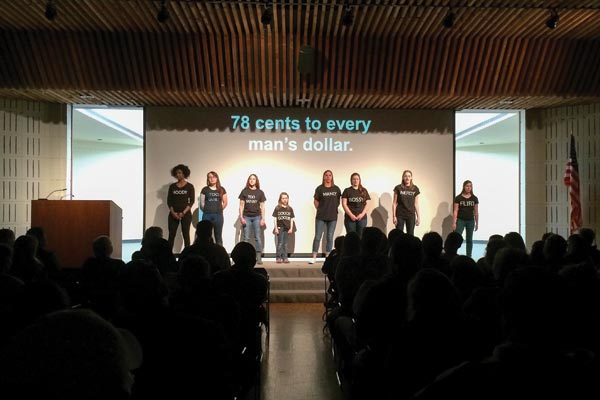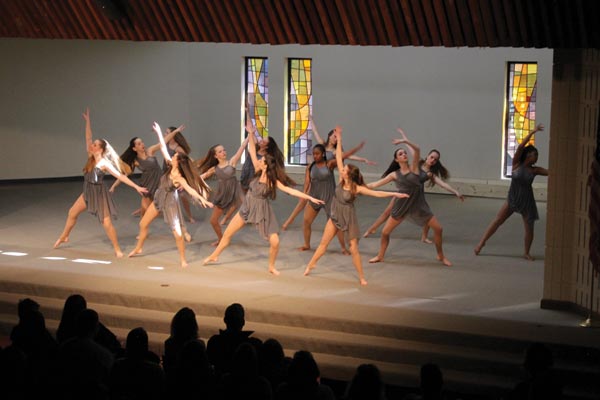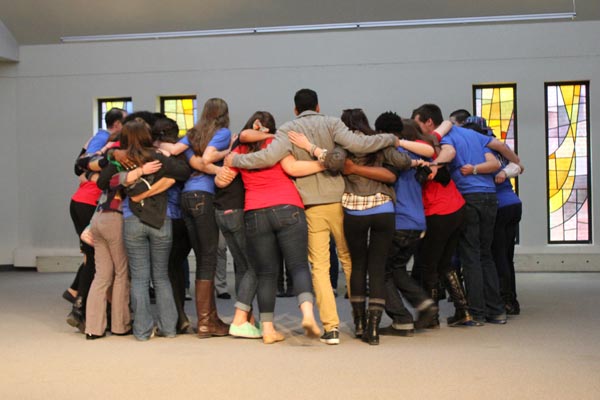Beyond Self
Teens Speak
Students present on social justice issues in a course-culminating Teen Summit
by Robin L. Flanigan
Sometimes it pays to go straight to the source.
After teaching an adolescent education course eight times at Nazareth College, Associate Professor of Adolescence Education Brian Bailey '01G, Ph.D., last fall pitched his syllabus to have students not only learn about teenagers, but with—and from—them.
The result: 15 Nazareth students and 17 students from Spencerport, Irondequoit, Fairport, and Rochester high schools enrolled in Adolescence Development and Social Justice, which looked at gender identity, racial segregation, stereotyping, and other topics teens deal with on a regular basis.
“We know learning is much deeper when kids are engaged in the community, when it’s thoughtful,” says Bailey. “This is the most meaningful course I’ve ever taught.”
It’s also as democratic a class as Bailey could make it. Except for a few non-negotiable rules, all decisions about content are made together. For example, the class is split into five groups that look at the various social constructs that define present-day adolescence. When the group in charge of academic content for the week was the one focused on education—in particular the relationship between district lines and school choice—it shared an article about what innovative classrooms look like. Bailey piggybacked on the theme with a research study on how educators are creating a generation of superficial learners.
“But we didn’t want to stop with learning for ourselves,” explains Bailey, who had volunteer help with the class from a Brighton High School teacher and a retired Rochester City School District teacher. “We said, ‘How can we spread an idea like this to the larger community?’”
The answer to that took months of planning and resulted in contributions to the Rochester Teen Summit, in which high school and college students used music, research, journalism, poetry, film, performance, and other art forms in 10- to 15-minute public presentations about teens and social justice. The presentations were modeled after TED Talks, video-recorded discussions about innovative ideas popularized by the nonprofit organization TED.
“We get to be creative and share our thoughts about things that people don’t usually want to hear,” says English literature/adolescence education major Zach Smith ’15.
At times, tackling tough subjects like racial stereotypes in class, even among each other, was uncomfortable. (Diversity among the high school students—eight of them white, nine of them black—was intentional.)
“We want to increase understanding,” says Bailey. “We made it clear that no one sitting in that classroom created these conditions, but we have the power to change them.”
More than 200 people learned how to do just that at the summit, which drew presenters from as far away as Pittsburgh. The 11 presentations included five from Bailey’s class. More personal than preachy, sometimes funny and often poignant, they challenged the audience to rethink the way school district lines are drawn, question assumptions about people based on skin color or street address, realize that the words used in passing to describe people can have a much deeper impact than intended, and more. In “We Go to a Segregated School,” for example, students pointed out that suburban kids view city kids as inferior and always skipping school, while city kids see their suburban counterparts as arrogant and living off their parents. “Watch Your Words,” meanwhile, pointed out that successful men are often considered ambitious while successful women are often described as bossy.
“It was nerve-wracking at first, but I think we accomplished more than we expected,” says Maggie Enos, a Fairport High School senior. “Hearing the audience reaction at the end, it was pretty clear they understood the message.”
Enos earned some personal accomplishments as well: “More responsibility, a little more maturity, time management, and quick thinking skills. I got so much more out of it than I thought I would.”
Required to do a senior capstone project at World of Inquiry School No. 58, Branwyn Wilkinson created a podcast about education as a social justice issue inspired by her class at Nazareth. “What’s really great about the class is that it’s an open environment for discussion,” she says. “I’m not as hesitant to share my ideas out loud there as I have been in other situations.”
Bailey hopes to reproduce the course’s results on a larger scale. He’s talking to organizers of TEDx FlourCity about a potential day-long youth event that would feature TED Talks by a diverse mix of young people. And he wants to have his students assist with a film he’s making with two local filmmakers about Rochester’s Urban-Suburban Interdistrict Transfer Program, to highlight the problem of segregation and concentrated poverty in Monroe County schools.
“This experience changes who you are, and that’s the most profound form of learning,” says Bailey, adding that the summit will go down as one of the best days of his life. “That’s the beauty of this class.”
The students evolved together over the course of the semester, proving that they can learn from each other no matter their age.
High-schoolers “have ideas that I have never once thought about,” says Sarah Getsy ’15, a double major in biology and inclusive education. “As the semester continued we grew not just [separately] as high school students and college students, but instead as just a class full of peers.”
Robin L. Flanigan is a freelance writer in Rochester, New York.

College, high school, and elementary school students warn the Teen Summit audience to "Watch Your Words."

25 North dance company performs "Say My Name"
